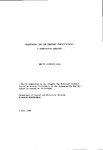VOLUNTARISM AND THE CRIMINAL JUSTICE SYSTEM : A COMPARATIVE ANALYSIS
| dc.contributor.author | GILL, MARTIN LAURENCE | |
| dc.contributor.other | Faculty of Arts, Humanities and Business | en_US |
| dc.date.accessioned | 2013-09-24T12:23:54Z | |
| dc.date.available | 2013-09-24T12:23:54Z | |
| dc.date.issued | 1986 | |
| dc.identifier | NOT AVAILABLE | en_US |
| dc.identifier.uri | http://hdl.handle.net/10026.1/1935 | |
| dc.description | Merged with duplicate record 10026.1/735 on 14.02.2017 by CS (TIS) | |
| dc.description.abstract |
This thesis comparatively evaluates three groups of volunteers working within the criminal justice system in the South West of England. The groups chosen - probation Voluntary Associates, police Specials and Victims Support Scheme Volunteers - incorporate parties working with the offender, the public and the victim, ie those most closely identified with the judicial process. To date, research in both Britain and abroad has chosen to focus on a single agency which has limited our understanding of voluntarismo Nevertheless, most have identified a number of issues pertaining to the use of volunteers. Through a consideration of the type of work undertaken, motivations, who volunteers, recruitment, selection and training, and the role of the professional, this thesis attempts to link and examine these issues, to illustrate that it is possible to theorise about voluntary activity in a criminal justice context. Via interviews with 164 volunteers supported by extensive observation it has been possible to gain a more detailed insight into voluntary activity than had previously been contemplated. The findings revealed that within each organisation there. ý exists a volunteer sub-culture, (abbreviated to volunculture), which conforms to the ideology of the agency. Where a volunculture is strong, as in the case of the Specials then commitment is high; where a volunculture is weak commitment is likely to be low. The study moves on to consider the ways in which organisational policy can and does affect not only the formationof-a volunculture, _ but also its degree of strength or weakness. It is shown that presently most organisations pay lip service to the notion of using volunteers, reflected in the low status they are accorded within agency priorities. It is argued that until this is realised the wealth of helping potential that exists within communities can never be brought to the fore. Recommendations derived from volunteer perceptions and organisational policies are offered as pathfinders to achieving this objective. | |
| dc.language.iso | en | en_US |
| dc.publisher | University of Plymouth | en_US |
| dc.title | VOLUNTARISM AND THE CRIMINAL JUSTICE SYSTEM : A COMPARATIVE ANALYSIS | en_US |
| dc.type | Thesis | |
| plymouth.version | Full version | en_US |
| dc.identifier.doi | http://dx.doi.org/10.24382/4768 |
Files in this item
This item appears in the following Collection(s)
-
01 Research Theses Main Collection
Research Theses Main


